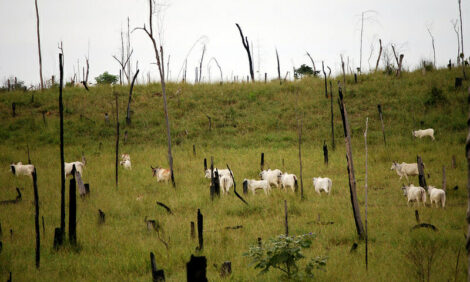



R-CALF Slams JBS Merger Plan in Hearings
US – During a hearing held by the Senate Judiciary Subcommittee on Antitrust, Competition Policy and Consumer Rights, R-CALF USA CEO Bill Bullard testified that permitting JBS to purchase National Beef Packing Co., Smithfield Beef Group, and Five Rivers Ranch Cattle Feeding would lessen competition in U.S. cattle markets and increase packer-held market power, ultimately harming both independent U.S. cattle producers and U.S. consumers.“R-CALF wants to thank the Subcommittee for conducting this hearing, and although most members did indeed express concern about the merger causing further concentration in the industry, we don’t yet know what action the Subcommittee will take as result of this hearing,” Bullard said.
“Because the Justice Department falls under the jurisdiction of this subcommittee, the first thing the subcommittee can do is put pressure on the Justice Department to thoroughly review this merger to determine its anticompetitive consequences,” he continued. “Unfortunately, the Justice Department does not have a good track record in protecting the interests of producers or consumers against mergers such as this.”
While testifying, Bullard described the U.S. cattle industry as “the single largest segment of American agriculture. It produces $50 billion annually; eleven states produce over a billion dollars a year. This industry is intrinsically important to the overall prosperity of Rural America.”
Bullard told the Subcommittee the cattle market that is directly impacted by this merger – the market for slaughter-ready steers and heifers – accounts for 27 million of the 45 million cattle that are sold each year. The steer and heifer market controlled by just four packers is the “industry price-maker,” and any price distortion that occurs in this segment of the market will reverberate throughout the entire live cattle industry, causing harm to all 970,000 cattle producers and the rural communities they support. Thus, he said, the market controlled by just four packers serves as a portal through which the entire industry is harmed by price distortions.
Bullard asserted studies have found that concentration distorts prices by about 3 percent. He explained that a 3 percent distortion within the $50 billion live cattle industry would result in a $1.5 billion loss to the nation’s cattle producers.
“The cattle industry is already besieged by market power,” Bullard testified. That market power is why the cattle industry has lost 40 percent of its cattle operations since the 1980s, why the U.S. cattle herd has been in an extended state of contraction, and why the historical cattle cycle is now disrupted, if not lost all together. This historical cattle cycle “has provided a bellwether indicator of the competitiveness of this industry,” he testified.
Bullard also stated it was an alarming irony that the U.S. cattle industry continued its contraction even after 1993, when domestic beef consumption began to increase dramatically. He said that since 1993 the U.S. cattle industry’s domestic production has not kept pace with increased domestic consumption and the spread between production and consumption was wider in the last few years than ever before. This phenomenon, he said, is counterintuitive to competitive market principles.
Bullard told the Subcommittee that the U.S. hog industry is further along in its drive toward consolidation and integration than is the cattle industry, and now that 90 percent of U.S. hog operations have exited the industry since 1980, the remaining 67,000 operations that still raise hogs are too few to maintain a robust, competitive market.
He said that Congress did not realize the mass exodus of hog producers until it was too late, and unless the present course of the U.S. cattle industry is changed, Congress will not see the mass exodus of cattle producers either “because it will happen one cattle operation at a time in one rural community at a time until we wake up one morning and see we’ve lost the critical mass within this industry to maintain a viable market.”
R-CALF USA hopes that legislation proposed by Sen. Charles Grassley, R-Iowa, and Sen. Herbert Kohl, D-Wis., is passed that would shift the burden of proof for the Justice Department, so that instead of the Justice Department having to prove a merger would lessen competition, the merging parties would have the burden of proving that a merger would not result in anticompetitive practices or a lessening of competition.
Further Reading
| - | Go to our previous news item on this story by clicking here. |
TheCattleSite News Desk


